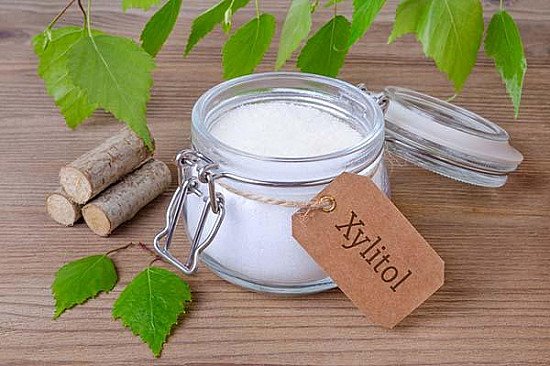[ad_1]

The next time you put sugar-free gum in your mouth, take a look at the ingredients list: chances are you’ll see an ingredient called xylitol. This sugar alcohol tastes like sweet sugar but has fewer calories and negligible effects on blood sugar and insulin.
For this reason, xylitol is used in many sugar-free gums, candies, baked goods, and sugar-free foods. You’ll also find xylitol in toothpaste, mouthwash, and other types of oral care products.
What is xylitol?
A sugar alcohol found naturally (in traces) in many fruits and vegetables, xylitol can be transformed from certain trees or a plant fiber called xylan. It tastes about as sweet as regular sugar, but with only about half the calories per serving. Store-bought xylitol is a white crystalline powder that can be used as an individual substitute for sugar in recipes.
What are the health benefits of xylitol?
Eating too much sugar has been linked to a host of serious health problems, including diabetesheart disease, obesityAnd tooth decaysugar-free sweeteners such as xylitol therefore constitute an interesting alternative.
Xylitol contains fewer calories and carbohydrates than sugar
Xylitol is a great alternative to sugar for people who need to monitor their weight, blood sugar, or both. Sugar alcohol contains about 2.4 calories per gram (compared to 4 calories per gram of regular sugar). This makes it a good option for those who want to limit their intake of simple carbohydrates, such as people with diabetes or related metabolic syndromes.
Xylitol does not cause blood sugar spikes
When measured on the glycemic index (GI), a measure of how quickly foods raise blood sugar, xylitol’s GI score is 7, while regular sugar has a GI score of around 60. Xylitol’s lower GI score correlates with more sustained energy without the spikes and drops associated with sudden consumption. of regular sugar.
Xylitol is good for dental health
Xylitol can help prevent tooth decay by reducing the levels of bad bacteria in your mouth. According to a goodbye published in the Journal of the International Society of Preventive and Community Dentistry, Consuming 5 to 10 grams per day of products containing xylitol (such as lozenges, candy, chewing gum, toothpaste, or mouthwash) significantly prevented cavities and tooth decay compared to products that did not. containing no xylitol. So don’t be surprised if your dentist recommends chewing gum containing xylitol at your next checkup.
Xylitol in everyday products
Many sugar-free products contain xylitol, including candies, gums, sugar-free baked goods, mints, cough syrup, chewable vitamins, some nut butters, ice cream, and health products. Oral hygiene such as toothpaste and mouthwash. You can also purchase xylitol in bulk at most grocery stores or online retailers for use in cooking and baking.
Possible side effects
Most people can add xylitol to their diet without noticing any side effects. But some people may experience digestive issues like gas, bloating, and diarrhea if they consume too much too quickly. If you notice any uncomfortable digestive issues, reduce your xylitol intake and reintroduce it slowly. And if you have other digestive problems, like irritable bowel syndrome (IBS), you may want to avoid sugar alcohols altogether.
In addition, an observational study published in the June issue of European Journal of the Heart found that high levels of xylitol were associated with a higher risk of heart attack or stroke in adults years later. Although more research is needed (the study was small and observational versus experimental), it’s best to control your xylitol intake.
Keep Xylitol Away From Your Dog
Xylitol is highly toxic to dogs, causing dangerous hypoglycemia, liver failure and even death. Keep sugar-free products out of reach of your dog and always check the ingredient label on ice cream and peanut butter before offering them to your pup.
[ad_2]
Source link
